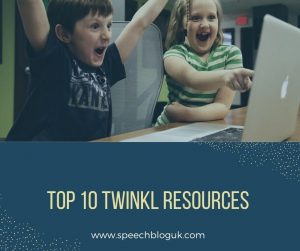Do you have a Twinkl subscription? We both do – we’ve had them for years. In fact, I’ve had my subscription so long, that I sometimes forget to check what’s new in there. There is so much stuff – whenever I’m stuck for a resource to work on a particular target, Twinkl is one of the places I go to. Here are some of the reasons why I love Twinkl
- They are resources in British English which is a bonus as a lot of the other apps and resources I use are American.
- There’s so much stuff in there that you are bound to find something for whatever target you need.
- They have loads of worksheets, but also loads of card resources and games which I tend to use more.
- If you can’t find what you’re looking for, you can create your own resources using their templates and picrures.
Disclaimer – We are not receiving anything for this post – we are just sharing things we find useful.
There are several levels of membership of Twinkl and you can get some nice free bits too, as far as I remember. You can check out the different membership options here. I have the highest level of membership, so I’m not sure at what point some of the resources listed here are available, but do check them out.
Here are 10 of our favourite Twinkl resourcees. We’ve tried to make them varied ones, covering many of the targets we commonly work on.
- Name 5 things. I work on categories a lot and there are lots of resources on Twinkl for making links and categorising. This is one of my favourites. There’s a similar but slightly harder version here too, which focusses more on attributes.
- Why question cards. You can find these at several different levels. These ones are simple why questions for younger children or children just grasping the idea. There are harder ones with more complicated answers here, and easier ones with multiple choice options here.
- There are a lot of resources for working on speech sounds on Twinkl and some nice packs that you can recommend to schools with activities at different levels to work through. This is a nice new game for “s” sounds which I downloaded immediately when I saw it. It works like Dobble but with all words starting with “s”. There is also one for k sounds available here. For more ideas of what to do with Dobble cards, see our post here. You could also do all of these things with these cards as well as practising speech sounds.
- Visual timetables are something which I often recommend to schools. There are some lovely pre-made visual timetable pictures here. This one is editable, so you can add your own options in if the ones that are pre-made don’t suit you. If you are a parent, there is one more tailored to home routine here.
- What’s wrong cards. These worked particularly well during teletherapy when we could draw on the pictures. The children had to tell me what was wrong and I would circle it onto the picture. Of course, they would work in person as well.
- What’s in the box. I used these a lot in teletherapy too, though they’d work just as well in person. I had quite a few kids who were just starting to work on inference and these were a really good starting point – they give three clues and you have to work out what’s inside. These were at the perfect level for the children I was using it with, but if you need an easier version with pictures, that is also available here.
- Continuing on the theme of inference, these cards are a great start into inferencing from a short passage. When I do this in speech therapy, I always like to use really short passages whatever the age of the child, as that way we can work on inference without being held back by any auditory memory difficulties.
- Conjunctions are something I work on frequently as children with language difficulties really struggle with them. These cards are good and there are lots of good worksheets such as these as well.
- Barrier games are something I often use in speech therapy. There is a nice pack of them here. When I take my turn, I often make sure I put the things in really unusual places so that they really have to listen and understand what I’ve said.
- There are some nice packs of activities for working on key words, which are great for giving out to schools as all the instructions are written out for them to follow. Here is the 3 key words pack and there are others too.
This list is just scratching the surface of all that’s available. The biggest problem is finding it. It’s worth spending some time putting different things in the search and also checking out the Inclusion tab at the top. Not everything I use is specifically an SEN resource though, so do search more widely on the site too.
Which Twinkl resources do you like best? Do share them in the comments so that we can all benefit from them….







Leave a Reply